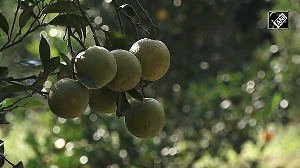Wednesday's Vikravandi by-election has become a referendum on the Stalin government, notes N Sathiya Moorthy.

If someone had predicted that the politico-electoral fortunes of the ruling DMK and Chief Minister M K Stalin's government would both take huge hits, one after the other, just weeks after the party-led INDIA combine's clean sweep in the Lok Sabha elections in Tamil Nadu, they would have been branded either as biased or unstable or both.
Yet, that is what has happened. First, it was the Kallakurichi hooch tragedy where the death toll mounted to 67, with no guarantee that there may not be an upward revision in the coming days if the condition of the hospitalised victims became unmanageable.
If that was not enough for records of crime in the state in two weeks, came the killing of state Bahujan Samaj Party leader S Armstrong, by six motorcycle-borne masked men, in the crowded industrial suburb of Perambur in Chennai.
Very few people had known that the BSP had a full-fledged branch in the state as it was not vibrant.
Even active politicians and political journalists had not known (much) about the dead man, fewer would have seen him or even recognised him in a photograph.
But his killing has taken the state by surprise, if not a storm.
An assembly by-election in the Vivkravandi constituency in northern Viluppuram district, adjoining the tragedy-ridden Kallakurichi district, is scheduled for Wednesday, July 10.
No one had any doubts that the DMK would comfortably win it, in the footsteps of the party combine's Lok Sabha poll sweep.
In fact, no one, starting with party cadres, believed Opposition AIADMK boss and former chief minister Edappadi K Palaniswami's explanation that the party's decision to not field a candidate owed to anticipated electoral malpractices.
Today, after the hooch tragedy and Armstrong killing, there are serious doubts if the DMK candidate would be able to make it in Vikravandi, where the PMK had fielded its candidate for the BJP-NDA, which too drew a blank, like the breakaway AIADMK ally, in the Lok Sabha polls.
There is a third candidate from actor-politician Seeman's NTK, which did creditably well with 10 per cent vote-share in the Lok Sabha polls, with some candidates polling a respectable hundred thousand votes or thereabouts, with a couple of them taking the third place in some constituencies.
The reasons are not far to seek. The hooch tragedy overnight destroyed the 'feel-good-factor' favouring the Stalin leadership and government as none else since he became chief minister in May 2021.
With the social media competing with the formal media -- both print and electronic media in the local language -- there was much information and interpretation for the people at large in general and the Vikravandi voter otherwise.
What political party leaders in the state, including that of the ruling DMK, have not understood for long is the sense of shame that pervades multiple layers of society when the state gets a bad name across the country and also in the international media.
They tend to punish the ruling party in circumstances such as these.
Or, they penalise whoever is considered as the 'bad element'.
Both have happened since the turn of the century, and the 2K kids, with their brethren working elsewhere in the country and overseas, too, not only imbibe the message but also spread the same, again on social media than through the customary word-of-mouth.
The ruling DMK's defeat in the post-2G assembly polls of 2011 owed to this factor, so have successive elections since then, not to leave out the way the Jallikattu protests got organised in January 2017 and into a massive rally that the rest of the nation neither understood, nor appreciated.
Rather, because they did not understand the cultural sentiments and the sense-of-denial involved in it all, the rest of India did not appreciate it.
But that is a different matter.

Of course, this time on the hooch tragedy, there is another minor argument over a major issue: Of the state government announcing Rs 10 lakh compensation to the families of victims (as always) whereas the next-of-kin of fire accident victims in match factories and Diwali cracker factories in the state get only Rs 3 lakhs each.
This was repeated even in the midst of the Kallakurichi episode, and that's what got the goat of apolitical or non-partisan observers.
The matter is now before the Madras high court, which has asked the state government to explain the rationale behind 'rewarding' hooch deaths.
Yes, the very illegality behind those deaths, and hence the compensation, whatever the amount, are unjustifiable, both morally and legally.
What adds another twist to the tale is the fact that legalised liquor is available in the state, that too sold exclusively by the state government as nowhere else in the country, making it unnecessary and 'unjustified' for drinkers to prefer hooch over the 'real thing'.
Rather, hooch is the 'real thing' for them as it gives more 'kick' than the official stuff.
Yet, no leader, including state BJP leader K Annamalai, has demanded total prohibition in the state in the face of the hooch tragedy.
Every political party and leader who aspired to come to power in the 2026 assembly polls talked about total prohibition.
They only talked about the failure of law enforcement and alleged involvement of ruling party leaders, bottom up, in all illegalities involving the government, starting with and including illicit liquor.

If pro-prohibition campaigners watching the tragedy and its follow-through from the sidelines were saddened by the deaths and also the political blame-game that meant nothing, the BSP leader's killing was another ball game altogether.
The social media posts by some faceless activists and police-friendly campaigners that Armstrong was himself an accused in over a dozen criminal cases, in and around the city, fell on deaf ears, almost as they began doing the rounds.
In its place, the very killing of the president of the state unit of a political party known across the country, his Dalit caste identity, etc, were pushed forward, quick and fast, that alongside the news of his late-evening killing appearing on the front-pages of newspapers on the third morning and the TV news channels the next day, there appeared condemnation on these counts -- all of them blaming the political leadership, not for complicity but inefficiency.
What should surprise the DMK leadership is the fact that going beyond political opponents and media critics, even allies did not spare the government.
Included in the list were Congress and Dalit-strong VCK allies of the ruling party from three successful past elections since 2019.
Not stopping with state Congress president Selvapernthagai, incidentally a Dalit, even Rahul Gandhi took note of the Armstrong killing.
To some people in the DMK, it was the 'unkindest cut'.
Then you had VCK leader Thol Thirumavalavan, a party compatriot who had won LS seats with comfortable margins in DMK's company.
He also said what even the political rivals of DMK and Stalin had not charged the government with.
Thiruma said that he did not believe that the six or eight who had surrendered to the police were not the real killers, as claimed by the police.
DMDK's Premalatha Vijayakanth, not a friend of the ruling party, raised an equally nuanced question as to how early reports of 'surrender' by the accused overnight became one of 'arrests' by the police.

The Armstrong killing has in a way pushed the hooch tragedy into the background but without erasing it from memory.
That was because BSP national president Mayawati made it a point to fly down to Chennai, to pay her respects, when Armstrong's body was placed in a Chennai municipal corporation school grounds in the crowded suburbs for people to pay respects.
Of course, the choice of a school grounds for the purpose has indicated how unprepared the government machinery was in tackling a crisis.
Yes, they can claim that by allowing it, they had defused a worse situation, as the authorities feared Armstrong's party men, supporters and henchmen blockading main roads, as they had done outside the prestigious Government Rajiv Gandhi Hospital on a main thoroughfare.
If the choice of the venue for keeping Armstrong's body for people to pay respects may have set a bad precedent, another one was averted when his wife moved the Madras high court for burying the body on the state BSP premises, as was allowed to DMDK's actor-politician founder Vijayakanth only months earlier, in the long un-up to the Lok Sabha polls, that is.
In a way, it needed the high court's intervention to set the house in order.
Justice Bhavani Subbarayan, both through her ruling and personal appeal to the petitioner-wife of Armstrong, to conduct the funeral elsewhere as the authorities had to clean the school grounds by Sunday evening for the classes to re-commence for the new week.
The judge told the petitioner, and through her, Armstrong's militant supporters and followers, how the government was right in not permitting the last rites to be performed on the party premises in a crowded locality with human habitation.
In comparison, there was no human habitation near the DMDK office, where Vijayakanth's body was allowed to be cremated.
However, she said Armstrong's followers could construct a memorial for him, elsewhere, after obtaining the necessary clearances from the authorities concerned.
Against this background, the ruling DMK is not as sure as bagging neutral voters that had sided with the party-led combine whole-heartedly in the Lok Sabha polls, now in the Vikravandi by-election.
A new element was added by VCK ally Thiruma's comments on the genuineness of those surrendered/arrested.
Questions are being asked if it was also a message to his party cadres and Dalit voters in Vikravandi not to vote for the DMK alliance-leader.
If so, to whom will those votes go -- to the PMK or NTK?
Or, that is the question in everyone's mind, though no one is talking about it.
However, the DMK still has a saving grace as AIADMK's EPS refused to endorse either the PMK or the NTA candidate, after Dr Anbumani Ramadoss and Seeman, respectively, appealed to him.
If yet, one of their candidates won the by-election, or came close to the victory line while the DMK still made it, it would mean that EPS would have to take instructions from his cadres, who had developed a mind of their own -- and not the other way round, as he seemed to have assumed.
On the sidelines of grave socio-political developments with possible electoral implications for the present and the future, EPS and BJP's Annamalai have also continued with their war-of-words even as they were targeting the DMK government and Stalin's leadership.
Likewise, EPS has not stopped telling his cadres that he would not make up with predecessor chief minister and one-time party compatriot, O Panneerselvam, OPS.

The Vikravandi by-election has become sensational without anything particularly happening -- or, not happening -- within the constituency's perimeter.
On the reverse side, the constituency has overnight acquired the status of being the 'conscience' of the state as a whole.
Rather, the by-election has pushed the Lok Sabha polls to the distant background and has become an overnight referendum on the performance of the Stalin government.
To be fair to him, the chief minister did not personally campaign in the by-election. Instead, he decided to make do with a video-message to the voters.
His son and minister, Udhayanidhi Stalin undertook a two-day campaign tour of the constituency, as if it were an after-thought, post-Kallakurichi.
It's all still an internal issue for the DMK that will not be remembered for long.
What will be remembered would be the result, especially because the current by-poll has been caused by the sudden death of the incumbent DMK legislator in the midst of the Lok Sabha polls, owing to a massive heart-attack.
That is to say, if the DMK regains the seat now, there will be no cause for celebration.
If it loses or if the party wins but the victory margin is low, it would be cause for deliberations -- not only within the DMK but also elsewhere, where realignment of political forces and creating required conditions for the same would be the topic.
That would mean that the DMK and the Stalin leadership would have lost the incumbent advantage that they had regained and reiterated in the Lok Sabha polls.
Instead, it would be a return to the pre-Lok Sabha poll sense of 'anti-incumbency' against the Stalin government, which only the overall anti-Hindutva sentiments wiped out after Prime Minister Narendra D Modi had made the Tamil Nadu polls, too, his own, as elsewhere across the country!
N Sathiya Moorthy, veteran journalist and author, is a Chennai-based policy analyst and political commentator.
Feature Presentation: Aslam Hunani/Rediff.com











 © 2025
© 2025